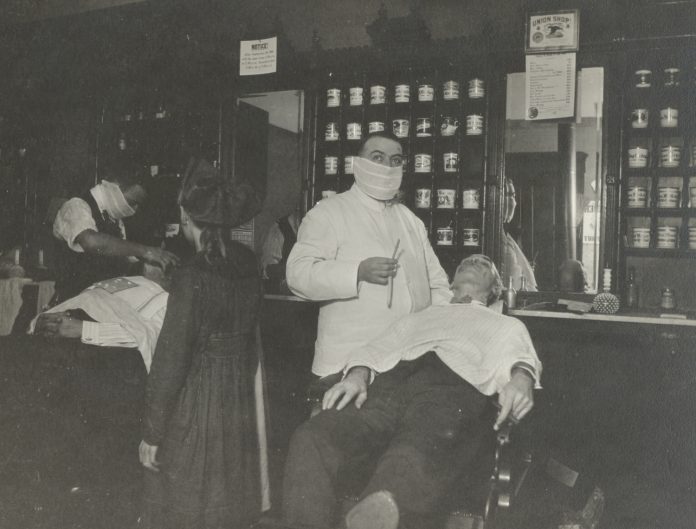
Just the “Grippe.” Only the grippe. Don’t freak out over the standard seasonal cough, fever, and aches that everyone calls “the grippe.”
Newspaper editors and writers are telling lots of readers today that the illness everyone’s talking about is simply another outbreak of seasonal flu. They say it in Cincinnati today when one of the city’s newspapers reports for the first time on widespread illness. They say the same thing in small-town publications in places like Winchester, a few miles from Boston, Massachusetts. And in newspaper after newspaper leading up to today, Day 11, September 18, 1918.
And some add on an extra thought. Dr. William Peters, Cincinnati’s acting health officer, tells a reporter that people should take comfort in the fact that their wartime enemy—the Germans—have had it, too. Peters reminds people in the city that, regardless, the illness is “more uncomfortable than serious.” More people of German descent and ethnicity live in Cincinnati than any other city in the US. Remarks like Peters’s have an especially cutting edge in such places.
But life gets a vote, and life insists upon casting the same vote over and over again on this day.
A descendant of Thomas Jefferson’s, medical doctor Colonel Jefferson Kean, is in France (where his famous ancestor had been) and talks ominously about a “sudden and serious increase in influenza-pneumonia” cases all around him. Scores of people in the Philadelphia naval yards fall ill today, as do hundreds of soldiers at Camp Gordon in Atlanta, Georgia; their cough is worse, the fever spikes, the aches seem different and more debilitating, and above all, a person sinks with horrific speed. Also, tied up at anchor and quarantined in the port of New Orleans is a United Fruit Company ship with 187 people and a load of ripe bananas aboard. 11 people on the vessel have influenza and are waiting out the day-long quarantine. The thick aroma—an invisible cloud—of rotting fruit fills the vessel.
A thought for you on Day 11, March 23, 2020, eleven days after President Trump declares Covid-19 a national emergency—there’s often this wide gray line between how it’s been, how it is, and how it will or might be. So hard to distinguish the edges of the wide gray line, really more of a cloud as often as not. Still, you have to know when things that appear somewhat the same are in fact not the same at all the same. You have to know, judge, decide, and conclude that this is different. You’ll get nowhere until you determine whether or not this is new and to what degree the newness is a defining, operative, and actionable feature. Have you made that decision? Did you change anything as a result?
(note to reader—I invite you to subscribe to this series/blog. The purpose of my posting in this series is the purpose of my enterprise at Historical Solutions—to explore the past in a new way that brings new and different value to you, both in the present (this minute) and on the edge of the future (what’s ahead or forward of this minute). The past is everything before now, the totality of all time before the present; history is a set of very small slices of the past that, for a particular reason, have been remembered. If you wish to contact me privately, please do not hesitate to text or call 317-407-3687)







